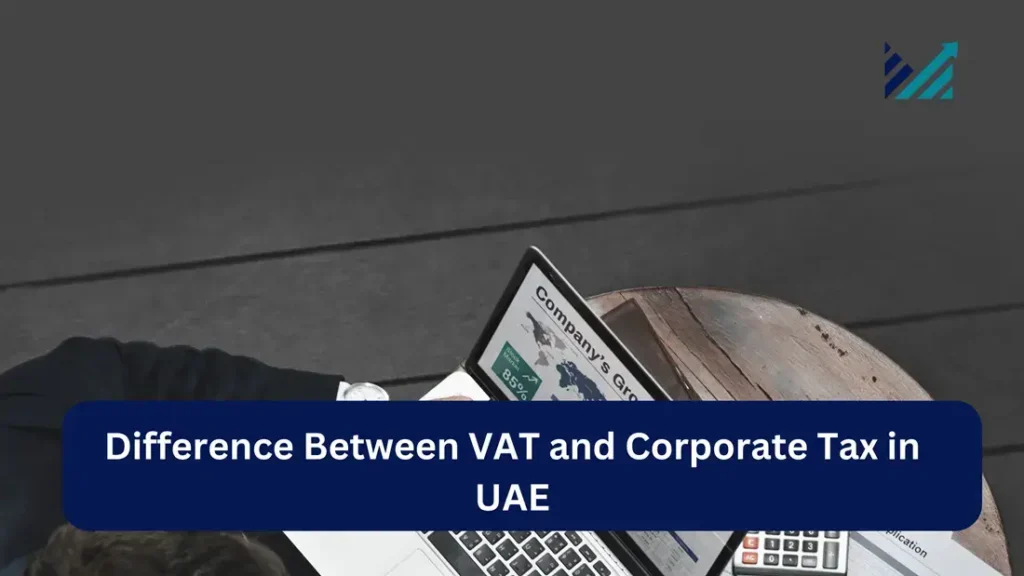
Understanding VAT and Corporate Tax is essential for businesses in UAE. VAT is a 5% consumption tax on goods and services. Businesses collect it from consumers and pay it to the government. Corporate Tax, introduced in 2023, applies a 9% tax on net profits above AED 375,000. This tax directly impacts business earnings. Both taxes have specific compliance rules. Businesses must follow deadlines, keep records, and meet legal obligations. Knowing the difference between VAT and corporate tax in UAE helps businesses stay compliant and avoid penalties.
Understanding VAT and Corporate Tax
What is Value-Added Tax (VAT)?
VAT is a consumption-based indirect tax applied at each stage of the supply chain, from production to the point of sale. It is ultimately borne by the final consumer but collected and remitted by businesses.
Legal Definition (UAE VAT Law):
“A tax imposed on the import and supply of goods and services at each stage of production and distribution, including deemed supplies.”
In simple terms: VAT is added to the sale price of goods and services and passed down to the consumer.
What is Corporate Tax?
Corporate tax is a direct tax imposed on the net profits of companies after deducting allowable expenses.
Legal Definition (UAE Corporate Tax Law):
“A tax imposed on the taxable income of legal persons and business entities operating within or having a connection to the UAE.”
In simple terms: Businesses pay corporate tax on the income they generate, not on individual transactions.
VAT vs. Corporate Tax: Key Differences
| Aspect | Value-Added Tax (VAT) | Corporate Tax |
|---|---|---|
| Definition | Tax on consumption of goods and services | Tax on a company’s net profit |
| Example | Product sold for AED 150 + 5% VAT → AED 7.50 VAT | AED 500,000 profit → Taxable: AED 125,000 → 9% = AED 11,250 |
| Implementation Date | January 1, 2018 | June 1, 2023 |
| Tax Rate | 5% flat rate | 9% on income exceeding AED 375,000 |
| Scope | Applies to most goods/services with exemptions | Applies to UAE-based and qualifying foreign businesses |
| Who Pays | Collected from consumers by businesses | Paid by the businesses themselves |
| Registration Threshold | Mandatory: AED 375,000+; Voluntary: AED 187,500–375,000 | All qualifying businesses; no set threshold |
| Payment Frequency | Quarterly VAT returns | Annually, 9 months post financial year-end |
| Calculation Basis | Transaction value at each supply stage | Annual net profit after deductions |
| Compliance | Detailed quarterly VAT filing + 5-year record-keeping | Annual return filing + maintaining audited accounts |
Impact on Business and Pricing
- VAT: Directly affects product pricing. It’s visible to consumers and included in the final sale price.
- Corporate Tax: Impacts a company’s profitability. Though not directly included in pricing, it may indirectly influence price strategies to maintain margins.
Connect with Certified auditors in Dubai
VAT vs. Corporate Tax: Pros and Cons
Value-Added Tax (VAT)
Advantages:
- Broad Revenue Base:
Covers a wide array of goods and services, ensuring a stable and scalable revenue stream. - Reduced Tax Evasion:
Since VAT is collected at each stage of the supply chain, it’s harder to avoid than single-point taxes. - Neutrality:
VAT does not discriminate between local and imported goods or between industries.
Disadvantages:
- Regressive Nature:
Disproportionately affects lower-income households, as VAT is levied equally regardless of income. - Administrative Complexity:
Businesses need to maintain detailed transactional records, increasing compliance costs. - Impact on Consumer Spending:
Higher prices due to VAT can reduce purchasing power and demand.
Corporate Tax
Advantages:
- Progressive System:
Taxes are based on net income, so more profitable companies contribute more. - Market Fairness:
Prevents large corporations from dominating the market due to disproportionate tax advantages. - Policy Flexibility:
Governments can tweak rates or offer incentives to boost specific sectors or economic activities.
Disadvantages:
- Potential Deterrent for Investment:
High tax rates might discourage foreign investment or expansion. - Risk of Tax Avoidance:
Companies may adopt profit-shifting strategies or exploit international loopholes. - Complex Compliance Requirements:
Businesses must calculate profits accurately and navigate ever-evolving tax laws.
Real-World Examples
VAT Example:
- A wholesaler purchases goods for AED 100 + 5% VAT (AED 5).
- Sells it to a retailer for AED 150 + 5% VAT (AED 7.50).
- VAT to remit = AED 7.50 (collected) – AED 5.00 (paid) = AED 2.50.
Corporate Tax Example:
- A business earns AED 500,000 in net profit.
- Taxable income = AED 500,000 – AED 375,000 = AED 125,000.
- Tax payable = 9% of AED 125,000 = AED 11,250.
Which Tax Affects Your Business More?
- Retailers and service providers are more impacted by VAT, as it’s integrated into pricing and sales volume.
- Large corporations and high-revenue businesses must focus more on corporate tax planning, as it directly affects net earnings and reinvestment capabilities.
Conclusion
Understanding the differences between VAT and Corporate Tax in UAE is vital for businesses operating in the region. While VAT affects the cost structure and consumer prices, corporate tax influences a company’s profitability and strategic decisions. Both taxes play crucial roles in the UAE’s journey toward economic diversification and long-term sustainability.
For business owners, staying compliant and strategically managing both taxes ensures financial health and regulatory adherence in the evolving UAE tax landscape.
VAT Vs Corporate Tax FAQs
1. What is the main difference between VAT and Corporate Tax?
VAT is a tax on goods and services. Corporate Tax is a tax on business profits.
2. Who pays VAT and Corporate Tax?
VAT is paid by consumers but collected by businesses. Corporate Tax is paid by businesses.
3. When should a business register for VAT?
Businesses must register if annual taxable supplies exceed AED 375,000. Registration is optional for revenue between AED 187,500 and AED 375,000.
4. How often must businesses file VAT and Corporate Tax?
VAT returns are usually filed quarterly. Corporate Tax is filed annually.
5. Are there exemptions for VAT and Corporate Tax?
Yes. Some goods and services are VAT-exempt. Certain businesses and free zone companies may be exempt from Corporate Tax.
Also Read: Is Audit Mandatory for Free Zone Companies in UAE?
6. What records should businesses maintain?
For VAT: Invoices, receipts, and transaction records for five years. For Corporate Tax: Financial records, revenue, and expenses.
7. What are the penalties for non-compliance?
Late filings, incorrect reports, and unpaid taxes can lead to fines and legal actions.
8. How is Corporate Tax calculated?
Corporate Tax is 9% on net profits above AED 375,000. If profits are AED 500,000, tax applies to AED 125,000, resulting in AED 11,250.
9. How can businesses reduce Corporate Tax liability?
Record expenses accurately, use allowable deductions, and get tax advice.
10. Does Corporate Tax affect the UAE’s business appeal?
Despite the tax, the UAE remains business-friendly. Free zone incentives and a competitive tax system attract investors.
Also Read

